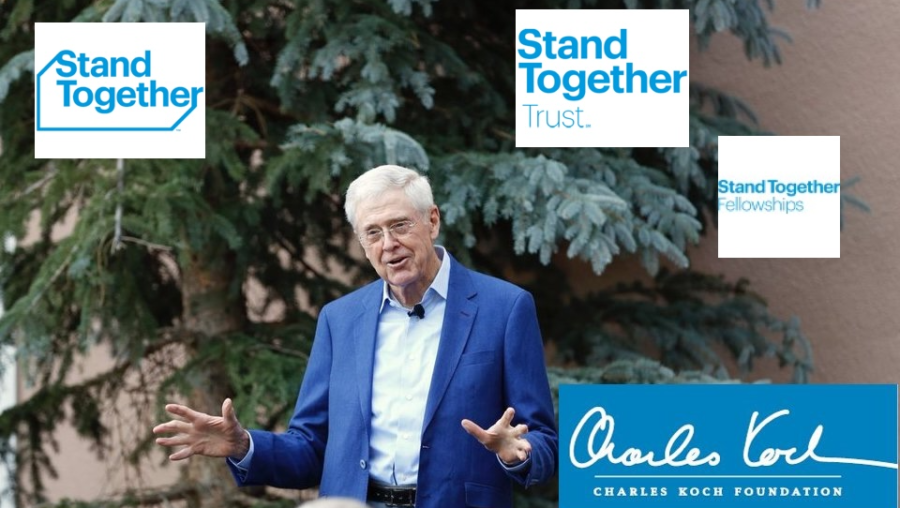Nonprofits controlled by Charles Koch funneled $458.7 million to 338 higher education beneficiaries between 2018 and 2022, according to a Center for Media and Democracy (CMD) analysis of IRS filings by the donor conduits.
Funding was channeled through the Charles Koch Foundation, Stand Together Trust, Stand Together Fellowships, and Stand Together Chamber of Commerce, with the foundation contributing the most to colleges and universities: $405.9 million of the total $458.7 million. This total excludes any funds the Koch family gave directly to schools or through donor advised funds.
George Mason University (GMU), by far the biggest beneficiary, received $128.6 million from the four Koch organizations for the university, the university foundation, and two affiliated think tanks (the Institute for Humane Studies and the Mercatus Center). Approximately $36.9 million of the $128.6 million total was specifically allocated to the Institute for Humane Studies, where the board includes Charles Koch as chairman emeritus along with Ryan Stowers from the Koch Foundation and Brian Hooks, who also serves on the boards of all three Stand Together nonprofits.
Arizona State University ($16.8 million), the Catholic University of America ($16 million), New York University ($14.1 million), and Utah State University ($12.1 million) account for the four universities with the next highest aggregate of Koch funding between 2018 and 2022.
Despite the Koch Foundation’s claims that it publishes “all our major, multi-year gifts to universities” on its website, it has only made 53 agreements publicly available since 2016. In fact, CMD found that $182.7 million (or 45%) of Koch Foundation funding between 2018 and 2022 went to institutions of higher education that have no posted grant agreements.
Catholic University, which received $13.3 million from the Koch Foundation in this time period, is among the beneficiaries whose “major, multi-year” gift agreement or agreements have not been posted to the foundation’s website. Similarly, despite the Koch Foundation’s IRS forms revealing that it gave $68.4 million to GMU and the GMU Foundation between 2018 and 2022, the “proposed grant schedules” from the three posted grant agreements (signed in 2016, 2018, and 2019) account for roughly only $12.3 million in total funding. The $26.5 million to the Institute for Humane Studies, also disclosed in the same IRS forms, is not mentioned in any of the three grant agreements.
The secretive nature of Koch funding for higher education has raised questions about potential donor influence and interference in academia. This includes opposition to Koch funding at Catholic University in 2013 from dozens of Catholic leaders who voiced concerns that the libertarian policies backed by the Koch network ran counter to the ethics and teaching of Catholicism. In 2019, George Mason University tightened its rules governing donor agreements in response to public backlash over the discovery that previous donor agreements with the Koch Foundation granted the foundation a say in academic hiring and firing decisions. Efforts by the student-led organization Transparent GMU to increase institutional accountability by obtaining donor information from George Mason University and its foundation under the Virginia Freedom of Information Act ultimately failed when the state Supreme Court dismissed the group’s petition in 2019.
Although the continued lack of transparency surrounding these major grant agreements has effectively obscured many specific conditions and details from the public, the motivations behind Charles Koch’s funding of higher education are very clear. A long-term strategy known as “The Structure of Social Change,” which he devised decades ago with his right-hand man Richard Fink, entails funding higher education as a means of educating young people on the benefits of free market capitalism. The policy papers produced by Koch-funded professors and researchers travel through the Koch network of think tanks and advocacy organizations, ultimately ending up in the hands of policymakers with the power to bring about the social change Koch favors.
In 1974, when Koch was president of the board of GMU’s Institute for Humane Studies, he gave a speech urging fellow trustees to financially support “only those programs, departments or schools that contribute in some way to our individual companies or to the general welfare of our free enterprise system.” Forty years later, Koch operative Kevin Gentry’s speech at the 2014 Freedom Partners annual meeting outlined the same strategic vision set forth in The Structure of Social Change. According to a recording obtained by the Center for Public Integrity, Gentry noted that “the [Koch] network is fully ingrained, so it’s not just work[ing] at the universities with the students, but it’s also building state-based capabilities and election capabilities and integrating this talent pipeline.” This, he concluded, is “useful” to Koch as he continues to spread the gospel about free market capitalism.
David Armiak contributed research to this report.



Sometimes I think the only hope we have is that young people will refuse to join in these systems of death. Mr. Koch seems to be of the mind that mere financial rewards will be enough for a generation who can feel the encroachment of climate change with its own senses to look away from the consequences of its actions. He may be right. If Trump is re-elected the counter elites will do all in their power to dispel the uncoolness factor of working for the man.
What ever it’s David Koch[rip] and his brothers have contributed not only to education, but funded hospitals like Memorial Sloane Kettering, New York Presbiterian Hospital Weill Cornel, HSS and have dedicated millions of their fortunes for the well being of humanity. People ignore that So what if the Koch brothers are providing funding WIth strings attached? NOBODY IS RESPONSIBLE FOR ANYBODY!